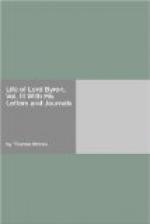“Expende—quot
libras in duce summo invenies.
—Mors sola fatetur
quantula hominum corpuscula.”
Juv.
x.
To these I have added a third inscription, in these words—’The gift of Lord Byron to Walter Scott.’[79] There was a letter with this vase more valuable to me than the gift itself, from the kindness with which the donor expressed himself towards me. I left it naturally in the urn with the bones,—but it is now missing. As the theft was not of a nature to be practised by a mere domestic, I am compelled to suspect the inhospitality of some individual of higher station,—most gratuitously exercised certainly, since, after what I have here said, no one will probably choose to boast of possessing this literary curiosity.
“We had a good deal of laughing, I remember, on what the public might be supposed to think, or say, concerning the gloomy and ominous nature of our mutual gifts.
“I think I can add little more to my recollections of Byron. He was often melancholy,—almost gloomy. When I observed him in this humour, I used either to wait till it went off of its own accord, or till some natural and easy mode occurred of leading him into conversation, when the shadows almost always left his countenance, like the mist rising from a landscape. In conversation he was very animated.
“I met with him very frequently in society; our mutual acquaintances doing me the honour to think that he liked to meet with me. Some very agreeable parties I can recollect,—particularly one at Sir George Beaumont’s, where the amiable landlord had assembled some persons distinguished for talent. Of these I need only mention the late Sir Humphry Davy, whose talents for literature were as remarkable as his empire over science. Mr. Richard Sharpe and Mr. Rogers were also present.
“I think I also remarked in Byron’s temper starts of suspicion, when he seemed to pause and consider whether there had not been a secret, and perhaps offensive, meaning in something casually said to him. In this case, I also judged it best to let his mind, like a troubled spring, work itself clear, which it did in a minute or two. I was considerably older, you will recollect, than my noble friend, and had no reason to fear his misconstruing my sentiments towards him, nor had I ever the slightest reason to doubt that they were kindly returned on his part. If I had occasion to be mortified by the display of genius which threw into the shade such pretensions as I was then supposed to possess, I might console myself that, in my own case, the materials of mental happiness had been mingled in a greater proportion.
“I rummage my brains in vain for what often rushes into my head unbidden,—little traits and sayings which recall his looks, manner, tone, and gestures; and I have always continued to think that a crisis of life was arrived in which a new career of fame was opened to him, and that had he been permitted to start upon it, he would have obliterated the memory of such parts of his life as friends would wish to forget.”




